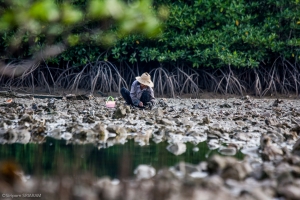A look back at 2016: Coastal conservation in Asia
Location: Bangkok, Thailand . 31st Jan 2017
Active in the region since 2007, MFF’s portfolio now includes 294 small grant projects, eight medium grant projects, 10 large grant projects and five regional grant projects worth over US$ 4 million spread across 11 member countries: Bangladesh, India, Sri Lanka, Pakistan, Myanmar, Indonesia, Cambodia, Thailand, Viet Nam, Maldives and Seychelles. Currently 55 projects are active, while 159 have been completed.
Completed projects include initiatives contributing to MFF's strategic focus areas: coastal rehabilitation; livelihood support; and resilience-building and empowerment, with climate change and gender as key cross-cutting issues. The programme also contributes to all 17 United Nations Sustainable Development Goals.
Agricultural land in the Delft Island, Sri Lanka © Kumudini Ekaratne
In terms of SDG Goal 1 'End poverty in all its forms everywhere', MFF focuses on promoting livelihood activities that are environmentally sound, economically realistic and sustainable. The programme develops models to guide livelihood restoration in post-disaster situations, encourage replicable community-led ecotourism activities, restore fisheries in tsunami affected areas and help market non-fish mangrove products. For example, in 2016, MFF launched the ‘Building Economic Resilience of Returned Coastal Communities through Sustained Ecosystems’ project in Sri Lanka’s Delft Island with the aim of creating income generating opportunities for coastal communities through the protection of mangrove ecosystems. The project has since trained local community members in hospitality management, as well as built eco-friendly cabanas.
In line with SDG Goal 5 'Achieve gender equality and empower all women and girls', 38% of MFF's projects have contributed to addressing women's needs since its inception. Through the provision of education and skills development training to women and their families, more than 80% of these projects resulted in a measurable increase in women’s income. This trend is continuing in 2016 and 2017 with MFF’s Cycle 5 projects.
By influencing policy and encouraging local communities to adopt best practices in effective and responsible coastal management, MFF is also a driving force behind SDG Goal 14 'Conserve and sustainably use the oceans, seas and marine resources for sustainable development'. In September, MFF featured on the world stage by participating in the IUCN World Conservation Congress. MFF’s Senior Operations Manager, Raquibul Amin, gave a presentation on resilience, adaptive management and transformation at a knowledge sharing session entitled “Scaling up nature-based solutions for adaptation and building resilience: Linking practice and policies”.
Re-excavation of Shapkhali canal, Koikhali, Shyamnagar, Satkhira, Bangladesh © IUCN and Caritas Bangladesh
In line with SDG 17 on partnerships, the ASEAN Centre for Biodiversity joined the Regional Steering Committee (RSC) of MFF, as part of a partnership with IUCN. In October 2016, IUCN and ACB signed a Memorandum of Understanding (MoU) to work together to support ASEAN countries in achieving their biodiversity targets. Both organisations will build on mutually shared objectives in biodiversity conservation and sustainable development, particularly in the context of the Strategic Plan for Biodiversity 2011-2020 and the recently adopted Sustainable Development Goals 2030 (SDG), to advance their commitments to sustainable development.
As part of the programme’s priorities for 2017, MFF will be ramping up its private sector engagement efforts, which currently includes partnerships with Marriott Hotels & Resorts and Thai Union Group, by working towards helping companies to assess and mitigate their impacts, connect with their supply chain and ensure sustainable sourcing for their businesses.
“The programme will place emphasis on enhancing member countries’ capacity to integrate private sector engagement strategies into their national programmes. The private sector, especially the tourism and fisheries industries, are important stakeholders. The sustainable management of coastal resources can only be achieved if these stakeholders are engaged and become active partners in the management process,” said Regional Programme Coordinator, Dr. Steen Christensen, on the programme’s priorities for the coming year.

During low tide in early morning in Salak Kok Bay, Trat, Ms. ... © Siriporn Sriaram